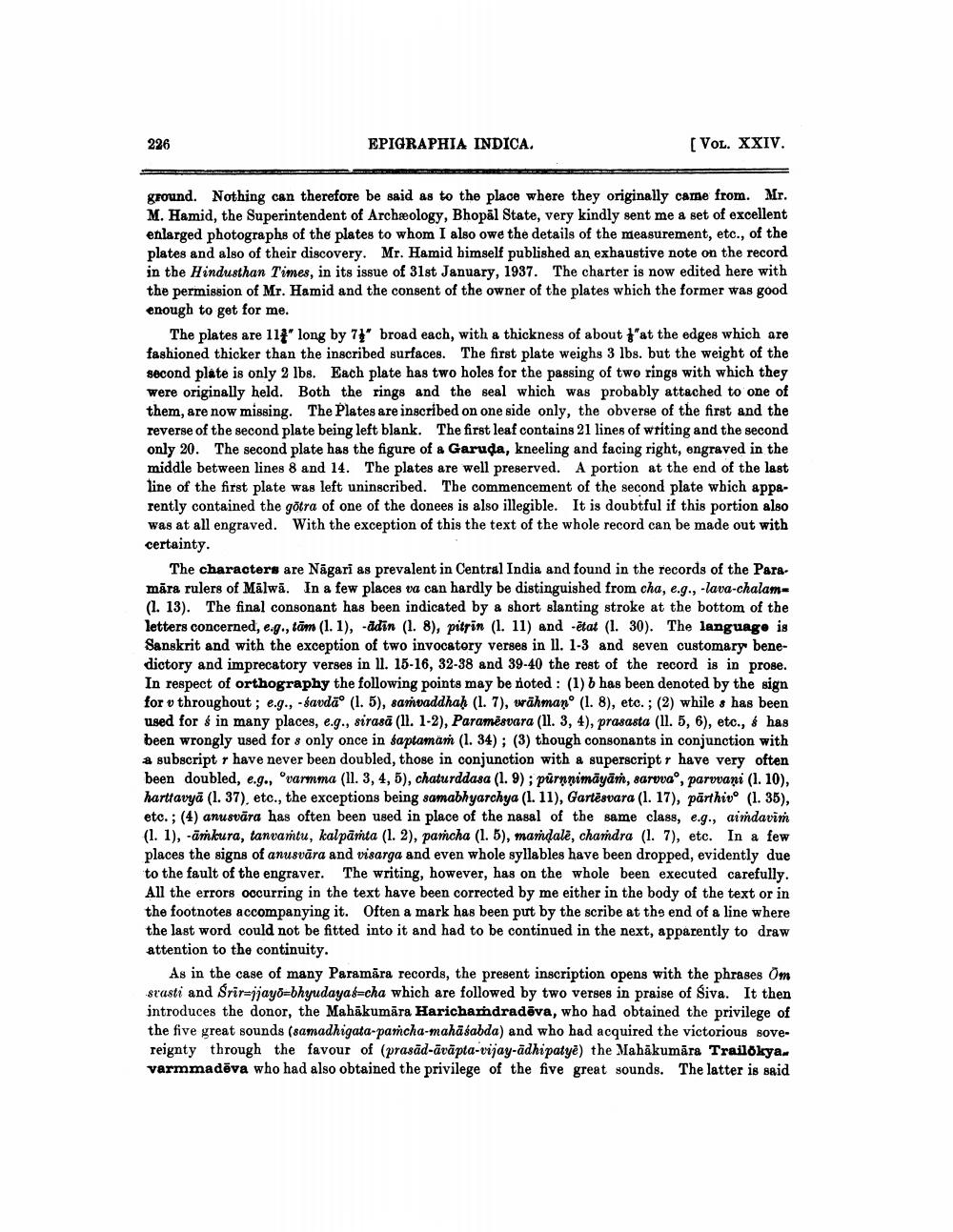________________
226
EPIGRAPHIA INDICA.
(VOL. XXIV.
ground. Nothing can therefore be said as to the place where they originally came from. Mr. M. Hamid, the Superintendent of Archaeology, Bhopāl State, very kindly sent me a set of excellent enlarged photographs of the plates to whom I also owe the details of the measurement, etc., of the plates and also of their discovery. Mr. Hamid bimself published an exhaustive note on the record in the Hindusthan Times, in its issue of 31st January, 1937. The charter is now edited here with the permission of Mr. Hamid and the consent of the owner of the plates which the former was good enough to get for me.
The plates are 114" long by 71" broad each, with a thickness of about t"at the edges which are fashioned thicker than the inscribed surfaces. The first plate weighs 3 lbs. but the weight of the second plate is only 2 lbs. Each plate has two holes for the passing of two rings with which they were originally held. Both the rings and the seal which was probably attached to one of them, are now missing. The Plates are inscribed on one side only, the obverse of the first and the reverse of the second plate being left blank. The first leaf contains 21 lines of writing and the second only 20. The second plate has the figure of a Garuda, kneeling and facing right, engraved in the middle between lines 8 and 14. The plates are well preserved. A portion at the end of the last line of the first plate was left uninscribed. The commencement of the second plate which apparently contained the götra of one of the donees is also illegible. It is doubtful if this portion also was at all engraved. With the exception of this the text of the whole record can be made out with certainty.
The characters are Nägari as prevalent in Central India and found in the records of the Paramāra rulers of Mālwā. In a few places va can hardly be distinguished from cha, e.g., -lava-chalam (1. 13). The final consonant has been indicated by a short slanting stroke at the bottom of the letters concerned, e.g., tām (1.1), -adin (1.8), pitrin (1. 11) and etat (1. 30). The language is Sanskrit and with the exception of two invocatory verses in ll. 1-3 and seven customary benedictory and imprecatory verses in 11. 15-16, 32-38 and 39-40 the rest of the record is in prose. In respect of orthography the following points may be noted : (1) has been denoted by the sign for v throughout; e.g., - savdão (1. 5), samvaddhah (1.7), wāhman (1. 8), etc.; (2) while has been used for & in many places, e.g., sirasā (ll. 1-2), Paramēsvara (11. 3, 4), prasasta (11. 5, 6), etc., & has been wrongly used for 8 only once in saptaman (1. 34); (3) though consonants in conjunction with a subscript r have never been doubled, those in conjunction with a superscript have very often been doubled, e.g., varmma (11. 3, 4, 5), chaturddasa (1.9); purnnimāyām, saruvao, parvuani (1. 10), harttavyā (1. 37), etc., the exceptions being samabhyarchya (1. 11), Gartēsvara (1. 17), pārthive (1.35), etc.; (4) anusvāra has often been used in place of the nasal of the same class, e.g., aindavin (1. 1), -āṁkura, tancamtu, kalpāṁta (1.2), parcha (1.5), mandale, chandra (1.7), etc. In a few places the signs of anusvāra and visarga and even whole syllables have been dropped, evidently due to the fault of the engraver. The writing, however, has on the whole been executed carefully. All the errors occurring in the text have been corrected by me either in the body of the text or in the footnotes accompanying it. Often a mark has been put by the scribe at the end of a line where the last word could not be fitted into it and had to be continued in the next, apparently to draw attention to the continuity.
As in the case of many Paramāra records, the present inscription opens with the phrases Om stasti and Srir=ijayobhyudayas-cha which are followed by two verses in praise of Siva. It then introduces the donor, the Mahākumāra Harichardradāva, who had obtained the privilege of the five great sounds (samadhigata-pancha-mahāśabda) and who had acquired the victorious sovereignty through the favour of (prasād-āvāpta-vijay-ādhipaty) the Mahākumāra Trailokya. varmmadēva who had also obtained the privilege of the five great sounds. The latter is said




